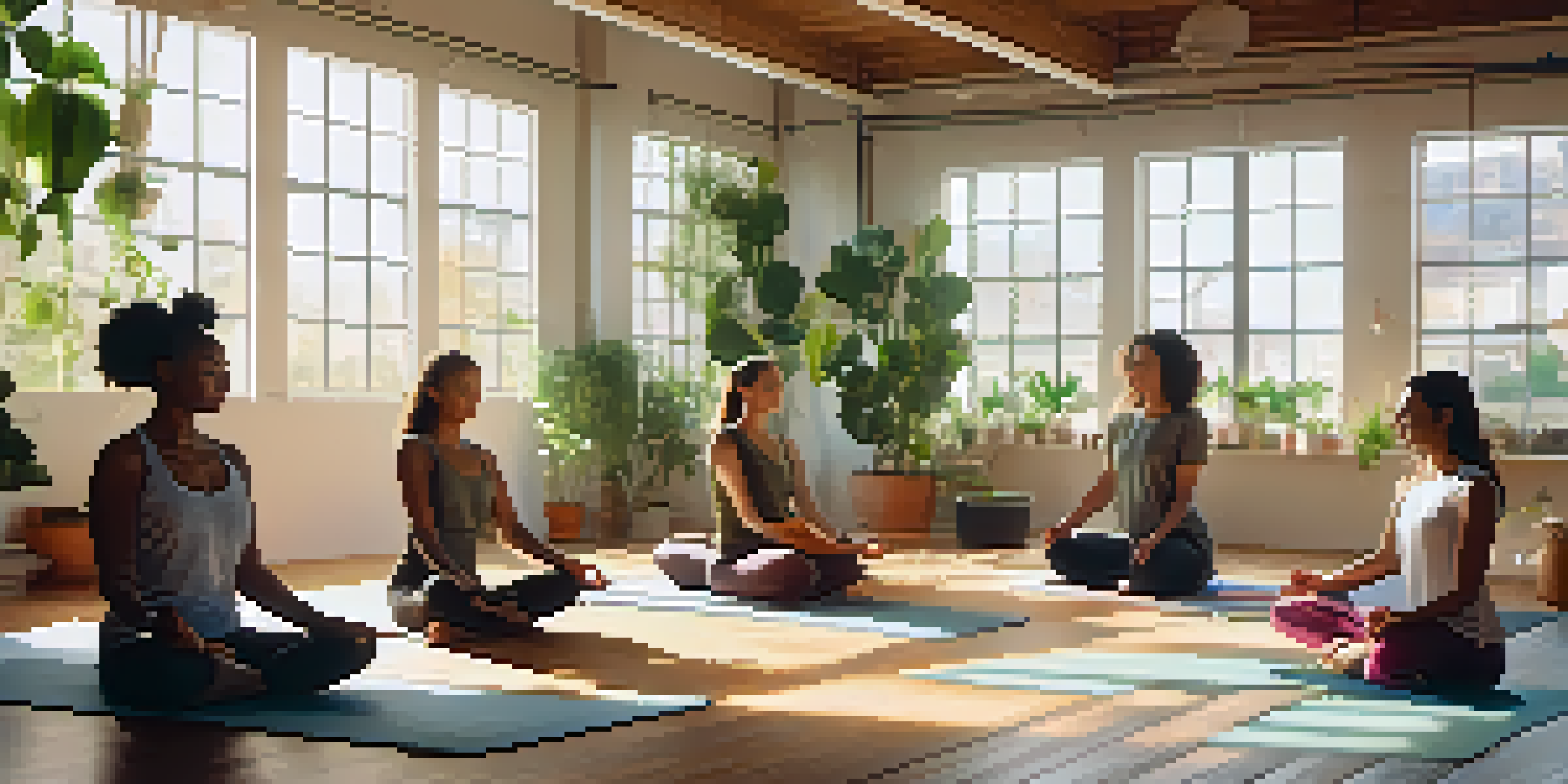Exploring Restorative Yoga for Women’s Emotional Wellness

What is Restorative Yoga and Its Benefits?
Restorative yoga is a gentle, calming practice designed to promote relaxation and healing. Unlike more vigorous forms of yoga, restorative yoga focuses on long-held poses supported by props, allowing the body to rest deeply. This relaxation response can have profound effects on emotional wellness, especially for women who often juggle multiple roles and responsibilities.
Yoga is the journey of the self, through the self, to the self.
By using props like blankets, bolsters, and blocks, practitioners can ease into poses that help release tension and stress. This approach not only calms the nervous system but also encourages mindfulness and self-awareness. As a result, restorative yoga can serve as a sanctuary for women, offering a space to reconnect with their emotions and inner selves.
Moreover, the benefits of restorative yoga extend beyond the mat. Regular practice can lead to improved mood, reduced anxiety, and a greater sense of emotional balance. This makes it a valuable tool for women seeking to enhance their overall emotional well-being.
The Importance of Emotional Wellness for Women
Emotional wellness is crucial for everyone, but women often face unique challenges that can impact their mental health. Hormonal fluctuations, societal expectations, and multitasking roles can all contribute to emotional strain. Understanding and nurturing emotional wellness can lead to greater resilience and overall happiness.

For many women, prioritizing emotional wellness means creating space for self-care and reflection. This can involve recognizing and addressing feelings of stress, anxiety, or fatigue. By taking a proactive approach to emotional health, women can cultivate a more balanced and fulfilling life.
Restorative Yoga Promotes Healing
This gentle practice fosters relaxation and emotional wellness, especially for women balancing multiple roles.
Practices like restorative yoga can play a significant role in this journey. By integrating restorative yoga into their routines, women can develop healthier coping mechanisms and foster a deeper connection to their emotions, leading to a more empowered and fulfilled existence.
How Restorative Yoga Supports Stress Relief
Stress management is a critical component of emotional wellness, and restorative yoga offers a unique approach. The practice encourages deep breathing and mindful movement, which can help release stored tension in the body. This process not only alleviates physical discomfort but also calms the mind, providing a much-needed escape from daily stressors.
The mind is everything. What you think you become.
During restorative yoga sessions, women are encouraged to slow down and tune into their bodies. This mindful awareness can reveal areas of tension and stress that may have gone unnoticed. By focusing on relaxation, women learn to let go of stress and cultivate a sense of peace and tranquility.
Additionally, the community aspect of yoga can enhance this experience. Sharing the practice with other women fosters connection and support, creating a safe space for emotional expression and healing. This sense of belonging can be incredibly beneficial for managing stress and improving overall emotional health.
The Role of Breath in Restorative Yoga
Breath is a fundamental aspect of yoga, and in restorative yoga, it takes center stage. The practice emphasizes deep, slow breathing, which can activate the body's relaxation response. This focus on breath helps calm the mind, making it easier to release emotional tension and stress.
As women engage in restorative poses, they are encouraged to synchronize their breath with movement. This mindful breathing not only enhances the physical practice but also promotes emotional awareness. The act of paying attention to breath can serve as a grounding technique, helping women stay present and connected to their feelings.
Emotional Wellness is Vital for Women
Understanding and nurturing emotional health can lead to resilience and fulfillment, making self-care essential.
Moreover, deep breathing can have physiological benefits as well. It can lower heart rate, reduce blood pressure, and increase oxygen flow to the brain. This holistic approach to wellness makes restorative yoga an excellent practice for women seeking to enhance their emotional and physical health.
Creating a Restorative Yoga Space at Home
Creating a calming space for restorative yoga at home can enhance the practice significantly. Choose a quiet area where you can set up your yoga mat, props, and any other items that promote relaxation, such as candles or essential oils. A comfortable environment can help you fully immerse yourself in the experience and encourage regular practice.
Lighting is also important when setting up your space. Soft, natural light or dimmed lamps can create a soothing ambiance that invites relaxation. Consider adding elements like plants or calming imagery to further enhance the tranquility of your space.
Lastly, think about incorporating your favorite calming sounds, whether that's soft music, nature sounds, or guided meditations. These elements will help you create a restorative sanctuary that not only promotes emotional wellness but also encourages consistency in your practice.
Incorporating Mindfulness into Your Practice
Mindfulness is an essential component of restorative yoga, and it can be cultivated throughout your practice. By focusing on the sensations in your body and the rhythm of your breath, you can deepen your connection to the present moment. This practice of mindfulness can help women become more aware of their emotions and how they affect their overall well-being.
As you settle into restorative poses, take time to notice how your body feels and what thoughts arise. This self-awareness can be a powerful tool for processing emotions and understanding their impact on your life. The more you practice mindfulness, the better equipped you'll be to navigate life's challenges with grace and resilience.
Mindfulness Enhances Yoga Practice
Incorporating mindfulness into restorative yoga deepens emotional awareness and helps manage stress effectively.
Regularly incorporating mindfulness into your restorative yoga practice can also lead to greater emotional clarity. By observing your thoughts without judgment, you can cultivate a sense of acceptance and compassion for yourself, fostering a more positive emotional state.
The Benefits of Group Restorative Yoga Classes
Participating in group restorative yoga classes can amplify the benefits of the practice. Sharing the experience with other women creates a supportive environment where emotional expression is encouraged. This sense of community can help reduce feelings of isolation, promoting emotional wellness among participants.
In a group setting, women can learn from each other and share their experiences, fostering deeper connections. This exchange can lead to new insights and perspectives on emotional health, enriching the practice for everyone involved. The shared energy in the room can also enhance relaxation and create a more profound sense of peace.

Furthermore, group classes are often led by experienced instructors who can guide you through techniques tailored to emotional wellness. These classes can provide valuable support and encouragement, making it easier to stay committed to your restorative yoga journey.